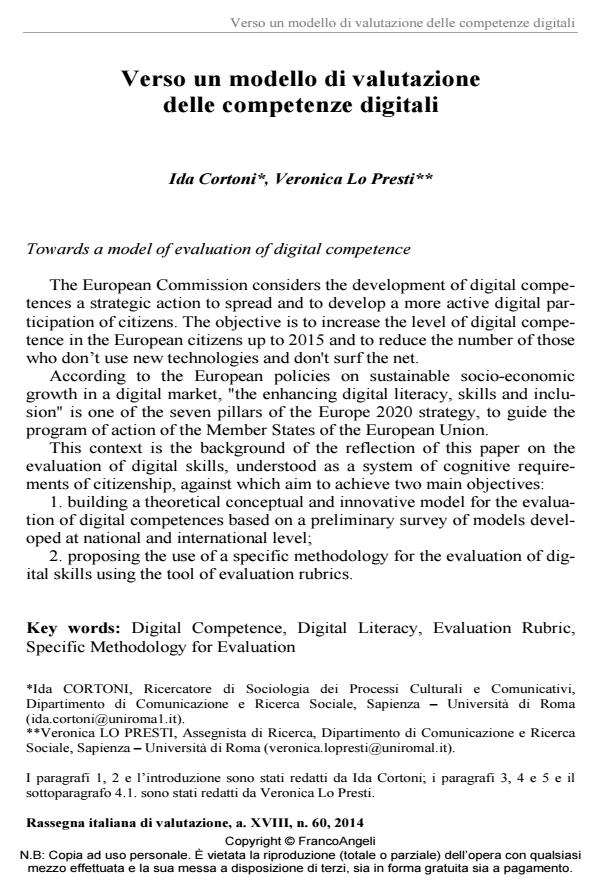Towards a model of evaluation of digital competence
Journal title RIV Rassegna Italiana di Valutazione
Author/s Ida Cortoni, Veronica Lo Presti
Publishing Year 2015 Issue 2014/60
Language Italian Pages 17 P. 7-23 File size 135 KB
DOI 10.3280/RIV2014-060002
DOI is like a bar code for intellectual property: to have more infomation
click here
Below, you can see the article first page
If you want to buy this article in PDF format, you can do it, following the instructions to buy download credits

FrancoAngeli is member of Publishers International Linking Association, Inc (PILA), a not-for-profit association which run the CrossRef service enabling links to and from online scholarly content.
The European Commission considers the development of digital competences a strategic action to spread and to develop a more active digital participation of citizens. The objective is to increase the level of digital competence in the European citizens up to 2015 and to reduce the number of those who don’t use new technologies and don't surf the net. According to the European policies on sustainable socio-economic growth in a digital market, "the enhancing digital literacy, skills and inclusion" is one of the seven pillars of the Europe 2020 strategy, to guide the program of action of the Member States of the European Union. This context is the background of the reflection of this paper on the evaluation of digital skills, understood as a system of cognitive requirements of citizenship, against which aim to achieve two main objectives: 1. building a theoretical conceptual and innovative model for the evaluation of digital competences based on a preliminary survey of models developed at national and international level; 2. proposing the use of a specific methodology for the evaluation of digital skills using the tool of evaluation rubrics.
Keywords: Digital Competence, Digital Literacy, Evaluation Rubric, Specific Methodology for Evaluation
- Bentivogli C., Catani M., Marmo C., Morgagni D., Le competenze invisibili, formare le competenze che tutti cercano, Franco Angeli, Milano, 2013
- Calvani A., Fini A., Ranieri M., (2010), La competenza digitale nella scuola. Modelli e strumenti per valutarla e svilupparla, Erickson, Trento.
- Castoldi M. (2005), Portfolio a scuola, La scuola, Brescia
- Celot P., Tornero J. M. P., (2009), Study on assessment criteria for media literay level. A comprehensive view of the concept of media literacy and an understanding of how media literacy levels in Europe should be assessed. Final report, Brussels.
- Commissione europea, (2014), European e-Competence Framework 3.0. User guide for the application of the European e-Competence Framework 3.0, CEN.
- Davidson E.J., (2005), Evaluation Methodology Basics: the nuts and bolts of sound evaluation, Thousand Oaks, Ca, Sage.
- Davidson E.J, (2014), “It’s the very core of evaluation and makes or breaks our work: so why is it hardly anyone’s toolkit?”, in Connection, March 2014.
- Eurostat (2013), The use of Internet and skills, Commissione Europea, Brussels Ferrari A., (2013), DIGCOMP: A Framework for Developing and Understanding Digital Competence in Europe, Scientific and Policy Report by the Joint Research Centre of the European Commission, Publications Office of the European Union, Luxembourg Le Boterf G., De la competence, essai sur un attracteur étrange, Paris, Editions d’organisations, 994
- Malizia G., Cicatelli S. (a cura di), (2009), Verso la scuola delle competenze, Armando editore, Roma.
- Nussbaum M. C., (2001), Diventare persone, Il Mulino, Bologna.
- Petracca M., (2004) Progettare per competenze, Milano, Emeldi
- Scriven M., (1995), Evaluation Thesaurus 5, Sage, Newbury Park.
- Sen A.K., (1993), Capability and Well-being, in M.C. Nussbaum e A.K.
- Spencer L. M. e Spencer S. M., (1995, Competenza nel lavoro. Modelli per una performanca superiore, Franco Angeli, Milano (titolo originale: Competence at work. Models for Superior Performance, John Wiley & sons, New York, 1993)
- Vergani A. (2013), Prove di valutazione. Libro bianco sulla valutazione, Franco Angeli, Milano
- Trinchero R., (2006), Valutare l’apprendimento nell’e-learning. Dalle abilità alle competenze, Erickson, Trento.
- Tornero J. M. P., (2004), PROMOTING DIGITAL LITERACY. Understanding digital literacy, final report EAC/76/03.
- Vygotskij L. (1978), Mind in society, Harvard University Press, Cambridge, Mass
- Storytelling 4.0 e Didattica. Un progetto di narrazione integrata e multipiattaforma che amplifica il processo di conoscenza nell'esperienza formativa e professionale Valentina Faloni, in RIV Rassegna Italiana di Valutazione 79/2022 pp.9
DOI: 10.3280/RIV2021-079002 - Il capitale socio-culturale nel trasferimento intra-familiare delle pratiche digitali Ida Cortoni, Loris Di Giammaria, in SOCIOLOGIA E RICERCA SOCIALE 118/2019 pp.70
DOI: 10.3280/SR2019-118004
Ida Cortoni, Veronica Lo Presti, Verso un modello di valutazione delle competenze digitali in "RIV Rassegna Italiana di Valutazione" 60/2014, pp 7-23, DOI: 10.3280/RIV2014-060002